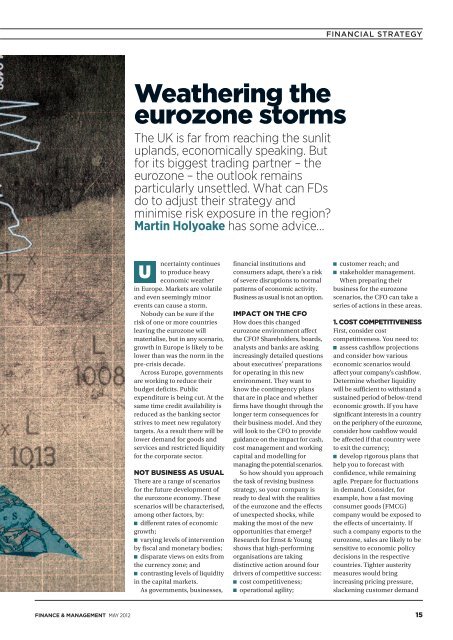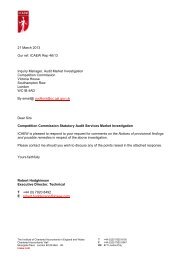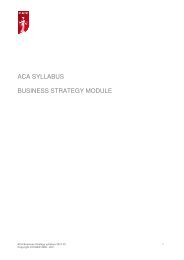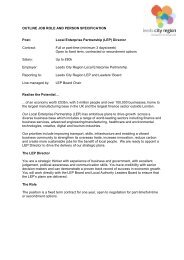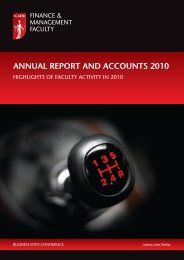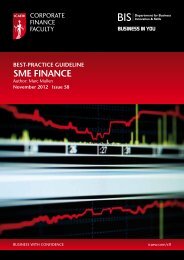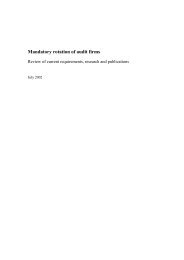Hit the road Positive leadership for troubled times - ICAEW
Hit the road Positive leadership for troubled times - ICAEW
Hit the road Positive leadership for troubled times - ICAEW
Create successful ePaper yourself
Turn your PDF publications into a flip-book with our unique Google optimized e-Paper software.
FINANCIAL STRATEGY<br />
Wea<strong>the</strong>ring <strong>the</strong><br />
eurozone storms<br />
The UK is far from reaching <strong>the</strong> sunlit<br />
uplands, economically speaking. But<br />
<strong>for</strong> its biggest trading partner – <strong>the</strong><br />
eurozone – <strong>the</strong> outlook remains<br />
particularly unsettled. What can FDs<br />
do to adjust <strong>the</strong>ir strategy and<br />
minimise risk exposure in <strong>the</strong> region?<br />
Martin Holyoake has some advice…<br />
U<br />
ncertainty continues<br />
to produce heavy<br />
economic wea<strong>the</strong>r<br />
in Europe. Markets are volatile<br />
and even seemingly minor<br />
events can cause a storm.<br />
Nobody can be sure if <strong>the</strong><br />
risk of one or more countries<br />
leaving <strong>the</strong> eurozone will<br />
materialise, but in any scenario,<br />
growth in Europe is likely to be<br />
lower than was <strong>the</strong> norm in <strong>the</strong><br />
pre-crisis decade.<br />
Across Europe, governments<br />
are working to reduce <strong>the</strong>ir<br />
budget deficits. Public<br />
expenditure is being cut. At <strong>the</strong><br />
same time credit availability is<br />
reduced as <strong>the</strong> banking sector<br />
strives to meet new regulatory<br />
targets. As a result <strong>the</strong>re will be<br />
lower demand <strong>for</strong> goods and<br />
services and restricted liquidity<br />
<strong>for</strong> <strong>the</strong> corporate sector.<br />
NOT BUSINESS AS USUAL<br />
There are a range of scenarios<br />
<strong>for</strong> <strong>the</strong> future development of<br />
<strong>the</strong> eurozone economy. These<br />
scenarios will be characterised,<br />
among o<strong>the</strong>r factors, by:<br />
different rates of economic<br />
growth;<br />
varying levels of intervention<br />
by fiscal and monetary bodies;<br />
disparate views on exits from<br />
<strong>the</strong> currency zone; and<br />
contrasting levels of liquidity<br />
in <strong>the</strong> capital markets.<br />
As governments, businesses,<br />
financial institutions and<br />
consumers adapt, <strong>the</strong>re’s a risk<br />
of severe disruptions to normal<br />
patterns of economic activity.<br />
Business as usual is not an option.<br />
IMPACT ON THE CFO<br />
How does this changed<br />
eurozone environment affect<br />
<strong>the</strong> CFO? Shareholders, boards,<br />
analysts and banks are asking<br />
increasingly detailed questions<br />
about executives’ preparations<br />
<strong>for</strong> operating in this new<br />
environment. They want to<br />
know <strong>the</strong> contingency plans<br />
that are in place and whe<strong>the</strong>r<br />
firms have thought through <strong>the</strong><br />
longer term consequences <strong>for</strong><br />
<strong>the</strong>ir business model. And <strong>the</strong>y<br />
will look to <strong>the</strong> CFO to provide<br />
guidance on <strong>the</strong> impact <strong>for</strong> cash,<br />
cost management and working<br />
capital and modelling <strong>for</strong><br />
managing <strong>the</strong> potential scenarios.<br />
So how should you approach<br />
<strong>the</strong> task of revising business<br />
strategy, so your company is<br />
ready to deal with <strong>the</strong> realities<br />
of <strong>the</strong> eurozone and <strong>the</strong> effects<br />
of unexpected shocks, while<br />
making <strong>the</strong> most of <strong>the</strong> new<br />
opportunities that emerge?<br />
Research <strong>for</strong> Ernst & Young<br />
shows that high-per<strong>for</strong>ming<br />
organisations are taking<br />
distinctive action around four<br />
drivers of competitive success:<br />
cost competitiveness;<br />
operational agility;<br />
customer reach; and<br />
stakeholder management.<br />
When preparing <strong>the</strong>ir<br />
business <strong>for</strong> <strong>the</strong> eurozone<br />
scenarios, <strong>the</strong> CFO can take a<br />
series of actions in <strong>the</strong>se areas.<br />
1. COST COMPETITIVENESS<br />
First, consider cost<br />
competitiveness. You need to:<br />
assess cashflow projections<br />
and consider how various<br />
economic scenarios would<br />
affect your company’s cashflow.<br />
Determine whe<strong>the</strong>r liquidity<br />
will be sufficient to withstand a<br />
sustained period of below-trend<br />
economic growth. If you have<br />
significant interests in a country<br />
on <strong>the</strong> periphery of <strong>the</strong> eurozone,<br />
consider how cashflow would<br />
be affected if that country were<br />
to exit <strong>the</strong> currency;<br />
develop rigorous plans that<br />
help you to <strong>for</strong>ecast with<br />
confidence, while remaining<br />
agile. Prepare <strong>for</strong> fluctuations<br />
in demand. Consider, <strong>for</strong><br />
example, how a fast moving<br />
consumer goods (FMCG)<br />
company would be exposed to<br />
<strong>the</strong> effects of uncertainty. If<br />
such a company exports to <strong>the</strong><br />
eurozone, sales are likely to be<br />
sensitive to economic policy<br />
decisions in <strong>the</strong> respective<br />
countries. Tighter austerity<br />
measures would bring<br />
increasing pricing pressure,<br />
slackening customer demand<br />
FINANCE & MANAGEMENT MAY 2012<br />
15


